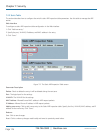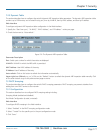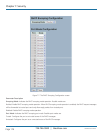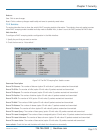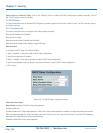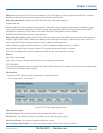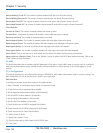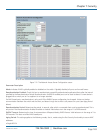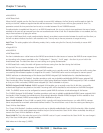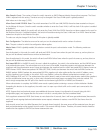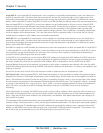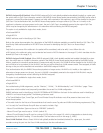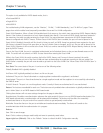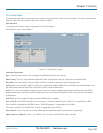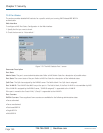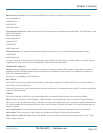
724-746-5500 | blackbox.com
Page 184
LGB5028A User‘s Manual
724-746-5500 | blackbox.com
Chapter 7: Security
• Multi 802.1X
• MAC-Based Auth.
When the NAS module uses the Port Security module to secure MAC addresses, the Port Security module needs to check for
activity on the MAC address at regular intervals and free resources if no activity occurs within a given period of time. This
parameter controls this time period and can be set to a number between 10 and 1000000 seconds.
If reauthentication is enabled and the port is in an 802.1X-based mode, this is not so critical, since supplicants that are no longer
attached to the port will get removed upon the next reauthentication when it fails. But if reauthentication is not enabled, the only
way to free resources is by aging the entries.
For ports in MAC-based Auth. mode, reauthentication doesn't cause direct communication between the switch and the client, so
this will not detect whether the client is still attached or not. The only way to free any resources is to age the entry.
Hold Time: This setting applies to the following modes, that is, modes using the Port Security functionality to secure MAC
addresses:
• Single 802.1X
• Multi 802.1X
• MAC-Based Auth.
If a client is denied access—either because the RADIUS server denies the client access or because the RADIUS server request times
out (according to the timeout specified on the “Configuration,” “Security,” “AAA” page) —the client is put on hold in the
Unauthorized state. The hold timer does not count during an on-going authentication.
In MAC-based Auth. mode, the switch will ignore new frames coming from the client during the hold time.
Set the Hold Time to a number between 10 and 1000000 seconds.
RADIUS-Assigned QoS Enabled: RADIUS-assigned QoS enables you to centrally control the traffic class that traffic coming from
a successfully authenticated supplicant is assigned on the switch. The RADIUS server must be configured to transmit special
RADIUS attributes to take advantage of this feature (see RADIUS-Assigned QoS Enabled below for a detailed description).
The “RADIUS-Assigned QoS Enabled” checkbox provides a quick way to globally enable/disable RADIUS-server assigned QoS
Class functionality. When checked, the individual port’s ditto setting determines whether RADIUS-assigned QoS Class is enabled
on that port. When unchecked, RADIUS-server assigned QoS Class is disabled on all ports.
RADIUS-Assigned VLAN Enabled: RADIUS-assigned VLAN enables you to centrally control the VLAN that a successfully
authenticated supplicant has placed on the switch. Incoming traffic will be classified to and switched on the RADIUS-assigned
VLAN. The RADIUS server must be configured to transmit special RADIUS attributes to take advantage of this feature.
The “RADIUS-Assigned VLAN Enabled” checkbox provides a quick way to globally enable/disable RADIUS-server assigned VLAN
functionality. When checked, the individual ports’ ditto settings determine whether RADIUS-assigned VLAN is enabled on that
port. When unchecked, RADIUS-server-assigned VLAN is disabled on all ports.
Guest VLAN Enabled: A Guest VLAN is a special VLAN—typically with limited network access—on which 802.1X unaware
clients are placed after a network administrator-defined timeout. The switch follows a set of rules for entering and leaving the
Guest VLAN as listed below.
The “Guest VLAN Enabled” checkbox provides a quick way to globally enable/disable Guest VLAN functionality. When checked,
the individual port’s ditto setting determines whether the port can be moved into Guest VLAN. When unchecked, the ability to
move to the Guest VLAN is disabled on all ports.
Guest VLAN ID: This is the value that a port's Port VLAN ID is set to if a port is moved into the Guest VLAN. You can change it
only if the Guest VLAN option is globally enabled.
Valid values are in the range [1; 4095].



